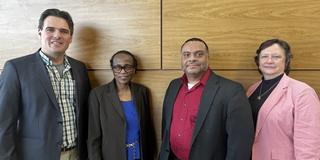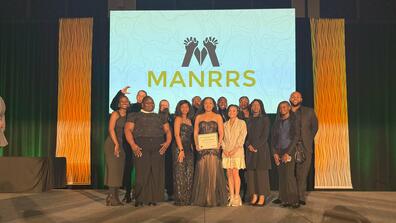
Professors help Ohioans SOAR through new research initiative

Above, from left: Drs. Jonathan Trauth, Greta Winbush, Edison Perdomo, and Kathleen Carter.
Four Central State University professors will contribute to a new research initiative to identify the root causes of the ongoing epidemic of persistent emotional distress, suicide, and drug overdose in the state of Ohio.
The State of Ohio Adversity and Resilience (SOAR) Study will investigate Ohioans in their local communities, using an integrated “bring science to the people” approach. It will create a statewide medical research and development ecosystem to drive continued advances in mental health and substance use prevention science and treatment interventions.
Drs. Jonathan Trauth, Edison Perdomo, Kathleen Carter, and Greta Winbush of Central State University will receive $500,000 for the longitudinal study, including $74,000 in its first 18 months.
“Ohio must be the model in helping our citizens overcome or adapt to mental health challenges so that they improve mental and physical health, complete an education, attain a good-paying job, support a family, and contribute to our communities,” Gov. Mike DeWine said at a Jan. 19 press conference. “We envision that the SOAR Study will jump-start future efforts to learn more about what Ohioans can do to better manage adversity and develop resilience."
Led by clinicians and researchers at The Ohio State University Wexner Medical Center and College of Medicine in collaboration with several Ohio universities, the SOAR Study will investigate the role of biological, psychological, and social factors that underlie this epidemic.
The Ohio Department of Mental Health and Addiction Services (OhioMHAS) is funding the statewide research project with an initial $20 million grant, according to a press release. Like other areas of the country, Ohio has seen a rise in mental illness, suicide, and deaths related to drug overdose over the past decade, and the COVID pandemic exacerbated these problems. This research investment demonstrates Ohio’s commitment to improving mental health.
“This is truly an amazing opportunity for us to participate in such an important study that can make a difference,” Perdomo said. “People of color face a number of socioeconomic disparities and inequities that often lead to unmanaged mental health, drug addictions, and other ailments.
“Through SOAR Study, the state of Ohio has partnered with agencies and universities ... to sample, study, and access the various challenges faced by minorities to determine the mechanisms by which individuals seek medical and psychological attention,” he continued. “Our particular focus at Central State is to study those systems and behaviors that create resiliency in the cultural rather than the negative stigmas associated with minorities. We believe that this study may provide us with a more comprehensive understanding of not only disparities across cultures, but the positive mechanisms employed by minorities to mitigate the effects of these inequities.”

This is truly an amazing opportunity for us to participate in such an important study that can make a difference. People of color face a number of socioeconomic disparities and inequities that often lead to unmanaged mental health, drug addictions, and other ailments.
Edison PerdomoAssociate Professor and Chair, Department of Social and Behavior Science
The SOAR Study has two parallel but connected projects:
-
Focusing on breadth, the SOAR Wellness Discovery Survey will engage as many as 15,000 people across all 88 Ohio counties. Researchers want to uncover how strengths and skills may be related to overcoming adversity. Those strengths will inform researchers about which factors to focus on to develop new treatments. This portion is underway with more than 300,000 postcards mailed out to residents statewide.
-
Focusing on depth, the SOAR Brain Health Study will comprehensively study as many as 3,600 Ohioans in family groups to examine the biological, psychological, and social factors that help explain that relationship, such as who does well with adversity, who does not, and why. Those discoveries will help researchers develop personalized treatments.
Launched in 1948, the multigenerational heart study has enrolled more than 15,000 study participants over 75 years, resulting in major life-saving advancements about heart disease risk factors.
Along with Central State and OSU, establishing collaborators include a multidisciplinary team of experts from the following Bowling Green State University, Case Western Reserve University/University Hospitals-Cleveland, Kent State University, Nationwide Children’s Hospital, NE Ohio Medical University, Ohio University, University of Cincinnati/Cincinnati Children's Hospital, University of Toledo, and Wright State University.
Meet the researchers
-
Position: Professor in the Department of Social Work
Degrees: Dual bachelor’s degrees in psychology and theology, Xavier University; Master of Social Work, University of Kentucky; Doctorate in Counseling, University of Cincinnati
Image
After graduating with his doctorate in 2016, Trauth traveled to El Salvador and to Nicaragua to help build water filtration systems and malaria-proofing latrines and was introduced to permaculture techniques for third-world country applications. He also worked for three years at the Clermont Recovery Center in Batavia, Ohio, with adolescents incorporating therapy through gardening. He then brought the ideas learned in horticulture therapy to clients and families at Lighthouse Youth Services, where he worked as a social worker and clinical supervisor. Last year, he completed his 72-hour permaculture certification. More recently at St. Leo the Great parish, Trauth began working with the Burundian refugee population. These refugees requested his help in obtaining land for farming so they could grow their own food. Observable outcomes that have had a significant impact on these refugees include community integration, self-efficacy, self-sufficiency, increase in business knowledge, opportunities for physical exercise for all ages, and a collaboration with different organizations focused on the creation and sustainability of a refugee garden.
-
Position: Associate Professor, Psychology, and Acting Chair, Department of Social and Behavioral Sciences, College of Humanities, Arts, and Social Sciences
Degrees: Bachelor’s degree, Rutgers University, State University of New Jersey; master’s and doctoral degrees, University of Iowa
Image
At Rutgers, Perdomo focused on the effects of behavioral contrast in the development of anxiety in animal models. Later, as a biopsychologist, he examined the role of early behavior in the development of cardiovascular and thermoregulatory systems. He is working on a cross-disciplinary, multistate project that aims to reduce the disparity in access to technical assistance and resources for minority-owned, underrepresented farmers using sustainable methods in response to climate change. He participated in research to understand the psychological implementation on regulating air, water, and solid waste.
“While primarily engineering issues, there is a need to investigate the role psychology plays in the Environmental-Energy Health nexus. Communities of color are equally affected by energy-related issues and environmental factors, but often lack the access, training, and ability to respond to the challenges of climate change,” he said.
Additionally, Perdomo has been working on issues of health disparities, food insecurities, and environmental justice. This research has also led to interest in exploring the role of urban gardening and horticultural therapy in the psychological and nutritional well-being of individuals living in poverty and in food deserts across the globe.
-
Position: Professor of Psychology and Gerontology, Department of Social and Behavior Sciences, CHAS
Degrees: Bachelor of Science in Psychology, Secondary Education, Central State University; Master of Science, Departmental Psychology, Howard University, Washington, D.C.; Master of Public Administration, Pennsylvania State University, University Park, Pennsylvania; Ph.D. in Human Development and Family Studies, Gerontology, Pennsylvania State University.
Greta Winbush, Ph.D., is a professor of Psychology and Gerontology in the Department of Social and Behavioral Sciences at Central State University. Her interdisciplinary training includes human growth and family development, aging and mental healthcare systems and policies, and public administration. Her experience includes research, teaching, and administration in academic and non-academic settings. As a Central State alum, Winbush’s many contributions to the University over the past 20 years have included psychology, gerontology and research academic programming, health disparities and health technology research, and mental health outreach.
Personal caregiving experiences have fueled her commitment to issues of health equity and disparity among racial and ethnic minorities through research, teaching and community service.
Winbush is a renowned researcher who has focused on health policy, behavioral health, and health services. Her research has mainly targeted African Americans, with particular emphasis on family caregiving, long-term care support services, culturally responsive health services, and community-based mental health services. She has led Central State’s efforts to receive funding for health disparity research, improve its research infrastructure, and offer mental health education and services on campus. Her work has earned national, state, and local recognition around health disparities. In the role of project director of a $4.2 million grant from the National Institute of Minority Health, Winbush guided the Center for Allaying Health Disparities Through Research and Education (CADRE) in its scholarly outcomes of 12 publications and 27 presentations at international, national, state, and local professional meetings. Faculty and over 20 CSU student researchers across diverse disciplines were partners in helping CADRE meet its project goals.
She received the Translational Research Award from the NIH through her work with Ohio State University’s College of Medicine on health empowerment and technology.
-
Position: Associate Professor and Interim Chair, Department of Agriculture and Life Sciences, John W. Garland College of Engineering, Science, Technology, and Agriculture
Degrees: Bachelor of Science in Dietetics, Miami University, Oxford, Ohio; Master of Science, University of Louisville; Master of Business Administration, Brenu University; Ph.D., University of Georgia; diploma, International Olymic Commitee Sports Nutrition program.
Image
Kathleen Carter has worked as an assistant professor and instructor in the Department of Health and Sports Science at the University of Louisville, Kentucky, and as a graduate teaching assistant in the Department of Kinesiology at the University of Georgia in Athens. Her research focuses on the impact of exercise and nutrition on health, specifically chronic inflammation, in underserved populations. Presently, she is studying the health of ROTC cadets, examining all their health parameters in response to new military health guidelines. She is also researching the health of athletes throughout the competitive season, including performance and health parameters.
Carter is interested in the SOAR Studies project as it will allow her to learn more about the health of underserved populations and identify which interventions could make a lasting difference.


